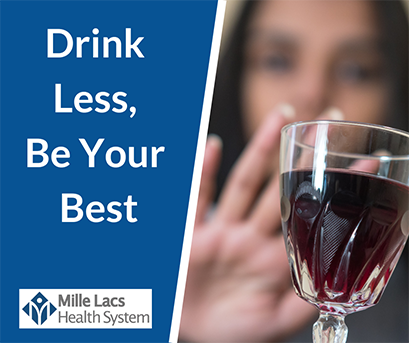Drink Less, Be Your Best
April 15, 2024
April is alcohol awareness month. The Center for Disease Control and Prevention’s (CDC) latest alcohol awareness campaign is called “Drink Less, Best Your Best”. They offer an amazing tool online to “check your drinking” and to make a plan to drink less if necessary. It’s a very short and simple questionnaire, completely anonymous, and gives you custom feedback right away based on your responses. You can save or download the file to use as a goal.
You can find the CDC’s questionnaire at www.cdc.gov/alcohol/checkyourdrinking. The questionnaire asks a bit about your demographics, average frequency of drinks, personal motivators to stop drinking, barriers to drinking less, and provides a custom plan to help in cutting back or quitting drinking.
For context, it’s important to understand what constitutes “a drink”. Typically for the various types of alcohol “one drink” is 12 ounces of beer, 8 ounces of malt liquor (beer with a higher alcohol by volume content), 5 ounces of wine, or 1.5 ounces of distilled spirits (vodka, rum, whiskey, etc.).
There are different classifications of “drinkers”. Those that drink in moderation consume two drinks or less in a day for men, or one drink or less in a day for women. Binge drinking is anytime a person’s blood alcohol content reaches .08 or above, or can be reflected in numbers with four or more drinks in one occasion for women, and five or more drinks for men. Heavy drinking is usually associated with addiction, a constant yearning for alcohol, and possible withdrawal symptoms when enough alcohol is not consumed. The CDC also classifies heavy drinking as eight or more drinks per week for women, and 15 or more drinks per week for men.
Drinking above the recommended limits of alcohol increases the risk for injuries and health problems such as: cancer, liver disease, high blood pressure, stroke/heart attack, digestive issues, mental health conditions, and poor sleep.
Drinking too much impacts your mind, body, and your life. The effects of drinking may be felt by others such as in relationship problems, employment issues, and legal issues.
If you need help in making changes with your alcohol consumption there is no better day than today to make that commitment. Not every method works for everyone and if you’re struggling to find what works for you, reach out to your medical provider for assistance.
